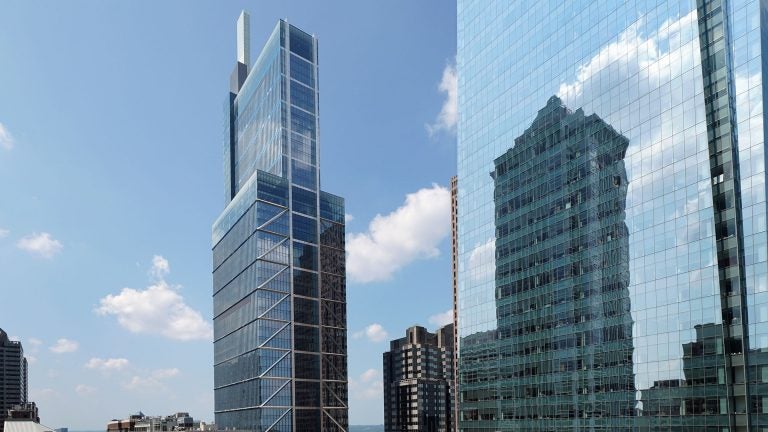Domb proposes 10-year tax abatement reform
City Councilman Allan Domb has introduced legislation to shrink — but not substantially change — the controversial tax break.

Comcast will not pay property taxes on the value of its $1.2 billion Technology Center until 2027. (Comcast)
This story originally appeared on PlanPhilly.
—
After more than a year of sharp debate over Philadelphia’s 10-year property tax abatement, City Councilman Allan Domb has introduced legislation to shrink — but not substantially change — the controversial tax break.
Domb’s bill proposes reducing the size of property tax abatements by winding down the benefit in 25 percent increments over its last three years, effectively reducing the subsidy by 15 percent.
“It essentially becomes an 8 and a half year abatement,” said Domb, who is also a real estate broker and the owner of a significant amount of Center City real estate. “That would be the least impactful option. I am concerned that changing the abatement dramatically will affect the market dramatically. We have to be very careful.”
Domb’s bill is the latest of several attempts to reform the 22-year-old development incentive. The program allows owners of newly constructed or rehabilitated properties to pay no property tax on the improvements for 10 years. (Recipients still pay tax on a property’s land value.)
Designed to spur revitalization at a time when Philadelphia was just starting to experience a turnaround from decades of population loss and economic decline, the tax abatement has become a lightning rod for criticism.
Many longtime residents hate the idea that they pay their property taxes, while people moving into new or rehabbed homes get a 10-year subsidy.
Education activists argue that it robs city schools of funding, because 55 percent of every property tax dollar goes to the Philadelphia School District.
Domb and other abatement supporters argue that the subsidy is needed to entice developers to build. Construction costs tend to be high in Philadelphia while rents are generally lower than peer cities in the region, they argue.
“The problem we have in Philadelphia is that the cost of construction in Philadelphia is the same as New York, but New York values and New York rents are four times ours,” said Domb. “If we want to create more jobs and more opportunity, we need this bill.”
The question of whether the abatement is part of a fix for inequality, or a driver of it, has gained momentum in an election year.
Councilwoman Cindy Bass introduced a bill that would eliminate it entirely. Councilwoman Helen Gym introduced multiple proposals, ranging from a cut much steeper than Domb’s to legislation that would eliminate the abatement on the portion of property tax revenues that go to the School District.
“I’m going to push as hard as I can for that,” said Gym. “I think it’s time and I think it’s clear that the people want to talk about [the abatement]. It’s probably the most popular thing that people want to address when I go out to different neighborhoods and communities.”
None of the reform bills have moved forward and received a hearing yet. But the fact that Domb, an ardent supporter of the abatement, has proposed a reform measure indicates that some change is likely.
“I think the question on the table is whether we tinker with it or do we do something that is actually going to have an impact on the city,” said Gym. “I don’t think tinkering around the edges of it will really have the impact that we need.”
WHYY is your source for fact-based, in-depth journalism and information. As a nonprofit organization, we rely on financial support from readers like you. Please give today.







